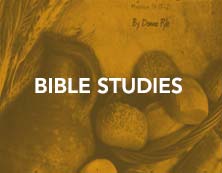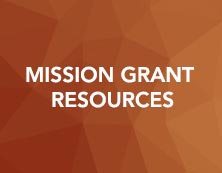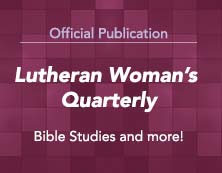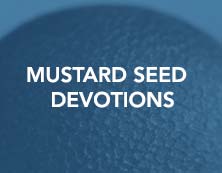INTRODUCTION
In recent years a common plea is for “less meeting” and “more mission.” However, when meetings are necessary, members want time to be spent wisely — including time spent working for the Lord. Expectations are that a meeting will:
- be well-planned, focused on the groups goals, and begin promptly;
- begin with prayer and inspiring devotions based on God’s Word;
- be led effectively so that business is transacted smoothly;
- be stimulating, with worthwhile programs;
- provide encouragement through unity and fellowship; and
- adjourn at the time promised.
HOW CAN THESE AIMS BE ACCOMPLISHED?
On this and the following pages are tools that are designed to help local LWML groups, zones, and districts conduct meetings effectively in the shortest time possible.
SCHEDULE REGULAR MEETINGS
Generally, a schedule of meetings is written into the bylaws so that members know the date of the next meeting (monthly, quarterly, etc.) even though they may not attend regularly. The hour at which meetings are to be held should not be specified in the bylaws, but should be established by a standing rule.
ESTABLISH A QUORUM
Organizations should decide the minimum number of members who must be present at a meeting to legally transact business. This number is called a quorum. A quorum protects the group from unrepresentative action. The quorum should not be any larger than the number of members who could ordinarily be expected to attend. It should be written as a provision in the bylaws.
CHOOSE EFFECTIVE LEADERS
A meeting needs a person who will preside and a person who will keep a record of action. While the word "preside" may sound formal and forbidding, parliamentary language is practical and concise. The presiding officer can effectively use parliamentary phrases to move business along quickly, while giving each member a chance to express an opinion and smooth the process of group decision-making. The secretary, or recorder, will keep minutes of what is done (see LWML Handbook, Meeting Minutes Helps).
DEVELOP EFFECTIVE BYLAWS
Bylaws should reflect the group's current thinking and present practice. If the bylaws have not been revised or amended for a year or two, they should be examined and steps taken to bring them up-to-date. It's a good idea for organizations to appoint a Structure Committee who will serve as a standing committee and carry out this function on a continuing basis.
CHARACTERISTICS OF A GOOD PRESIDENT
In conducting meetings, the president strives to:
- be fair and impartial;
- be diplomatic;
- give each member the opportunity to speak; and
- maintain order and expedite business efficiently.
An LWML president (local group, zone, district, or national) should try to foster an atmosphere of Christian love, grace, tact, and thoughtful personal consideration to all in attendance.
AT MEETING TIME, THE PRESIDENT WILL:
- Arrive early enough to check on arrangements for the room (tables, chairs, microphone, comfort level, lighting), allowing enough time to take care of the unexpected. (She may have delegated these responsibilities to someone else.)
- Welcome guests with warm hospitality. (She will speak their names clearly or if they are unknown to her, ask someone else to introduce them to the assembly.)
- Establish a quorum. It is the duty of the person who will preside to determine whether there is a quorum before calling the meeting to order. The presiding officer may wait until the required number of members arrives. If a quorum is not reached, the chair calls the meeting to order and declares the lack of a quorum.
IF MEMBERS TAKE ACTION WITHOUT A QUORUM (OTHER THAN TAKING ACTION TO SEEK A QUORUM OR FIXING THE TIME TO WHICH TO ADJOURN), THEY DO SO AT THEIR OWN RISK AND HOPE THAT THEIR DECISIONS WILL BE RATIFIED AT A LATER MEETING.Then the chair has five options:- call for a motion to adjourn;
- call for a motion to take measures to obtain a quorum;
- call absent members;
- call for a motion to continue the meeting at another time; or
- motion to Fix the Time to which to Adjourn.
- Open the meeting at the scheduled time (if a quorum is present), knowing that this is only being fair to those who have arrived on time. (Sound a note of joy from the opening tap of the gavel! Serving the Lord with gladness makes each meeting another opportunity for joyful service for all.)
- Work from a prepared, written agenda, giving copies to the secretary, other officers, and possibly the members. (Knowing the order of business helps everyone to be alert to matters that will be discussed.)
- Lead the assembly confidently as she moves through the agenda if she has at each meeting:
- a copy of the group's bylaws;
- Robert's Rules of Order Newly Revised (the parliamentary authority adopted by LWML);
- the organization's handbook; and
- a gavel.
MEETING AGENDA
Place the date and location of the meeting on the agenda.
- Call to order
- Opening devotion and/or Bible study
- Roll call (optional)
- Reading of the minutes (if they have not been provided to the assembly before the meeting) and approval of the minutes
- Financial statement or report
- Reports of:
- officers
- boards
- standing committees
- Reports of special committees
- Special orders (such as elections or business prescribed by the bylaws)
- Unfinished business and general orders
- New business
- Announcements (placed here or after the program)
- Program (if not presented before the meeting)
- Adjournment
- Closing prayer/hymn
Related Resources on the LWML Website
Parliamentary Basics for Everyone
President Guidelines
Secretary Guidelines
Structure Committee Guidelines: Enabling You to Build Better Bylaws








